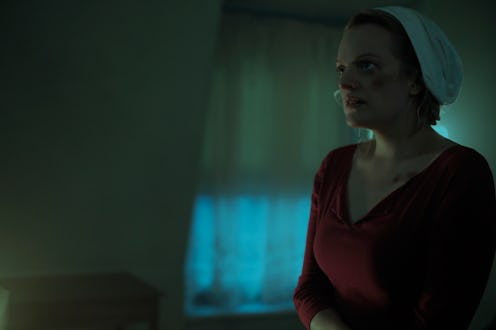Entertainment
'The Handmaid's Tale' Pulls From The Real Bible

Nobody going into Hulu's new series The Handmaid's Tale expected it to be a fun, lighthearted romp of a TV show. After all, it’s based on a dystopian novel by Margaret Atwood where fertile women are forced into servitude by an extreme religious regime, which is not exactly a picnic. And, one of the most upsetting scenes of the series premiere is the sexual ritual that Offred’s forced to endure. The Handmaid's Tale sex ceremony uses a real Bible passage from The Old Testament as justification for the act.
Before the ritual takes place, the Commander reads from a translation of Genesis 30:1 found in the Kings James Bible, which was first published in 1604 and is still used by some fundamental Christian sects today. The full text appears below, with the lines that appear in the show bolded for emphasis:
And when Rachel saw that she bare Jacob no children, Rachel envied her sister; and said unto Jacob, Give me children, or else I die. And Jacob's anger was kindled against Rachel: and he said, Am I in God's stead, who hath withheld from thee the fruit of the womb? And she said, Behold my maid Bilhah, go in unto her; and she shall bear upon my knees, that I may also have children by her. And she gave him Bilhah her handmaid to wife: and Jacob went in unto her. And Bilhah conceived, and bare Jacob a son.
In The Handmaid’s Tale, the leaders of America's new oppressive government appear to have taken this passage at face value. During the ritual, Offred is made to sit with her head in the lap of the Commander’s wife, literally upon her knees, while the Commander has sex with her. It’s even more disturbing to watch in the episode than it sounds; everyone remains fully clothed, no one looks at each other, and the Commander’s wife is even holding Offred down.
Given that the Republic of Gilead doesn’t seem to care about anyone’s basic human rights, it makes a grotesque sort of sense that they’d justify their subjugation of women based on ancient text alone. However, the context in which it appears in the Old Testament complicates matters in an interesting way. Genesis 29 states that Jacob falls in love with Rachel on first sight, but is tricked by her family into wedding her older sister Leah instead. Eventually he ends up married to both of them, but Leah still feels unloved and appeals to God, so He grants her fertility to ease her pain. Rachel only struggles to bear her own sons, some ministries suggest (like the Evangelical Christian website Bible.org, for example), because her motivations are rooted in envy and greed rather than the piety and devotion that Leah exhibits — even though both of them allow Jacob to sleep with their maids and claim the children as their own.
So basically, in trying to find a religiously-mandated solution for their population problem, the Republic of Gilead encourages their subjects to emulate a biblical figure who many modern-day Christian and Jewish scholars use as a teaching example of what not to be like. Regardless of your own beliefs, you have to admit that’s pretty ironic — and probably exactly the point that author Margaret Atwood was trying to make about the inherent hypocrisy of fascist states.
Of course, that’s not the only way to interpret this passage. When viewed through a feminist lens, you could also argue that it depicts women struggling to become more valuable to a man in a position of authority, using other women's bodies as cannon fodder in the process — which, surprise surprise, is exactly what happens in this show.
The Handmaid's Tale might be important and meaningful, but trust me: as the series goes on, it won’t get any less traumatic watching women hurt one another for power. Expect to see a lot more of it before the season ends.